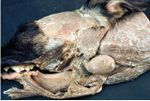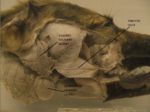Parotid Gland - Anatomy & Physiology
Jump to navigation
Jump to search
|
|
Parotid Salivary Gland
- Serous secretion
- Moulded around base of auricular cartilage of ear
- Enclosed within facial covering
- Trabeculae divide gland into lobules
- Major ducts run within trabeculae and merge to form a single duct
- Duct opens in vestibule opposite 4th upper premolar (Not all species)
Development
1. Intercalated duct. Cuboidal cells.
2. Striated duct. Cuboidal cells with mitochondria in base.
3. Interlobular duct. Columnar to stratified columnar cells.
4. Stratified squamous epithelium continuous with epithelium lining oral cavity
Histology
- Basophilic endoplasmic reticulum
- Stratified squamous epithelium
- Tubulo-acinar gland
- Acinar cells surrounded by myoepithelial cells and basement membrane
Species Differences
Carnivores
- Some mucous secretion in cat and dog
- Duct is superficial in dog
- Duct runs across masseter muscle in carnivores
Herbivores
- Larger gland and higher flow rate in herbivores to lubricate and soften food
- Duct is superficial in small ruminants
- Parotid gland extends rostrally over masseter muscle, ventrally to angle of jaw and caudally towards atlantal fossa
- Duct runs ventrally in herbivores below the mandible (facial groove in horses) before entering the oral cavity at the rostral margin of the masseter muscle
Equine
- Gland overlies the gutteral pouch

